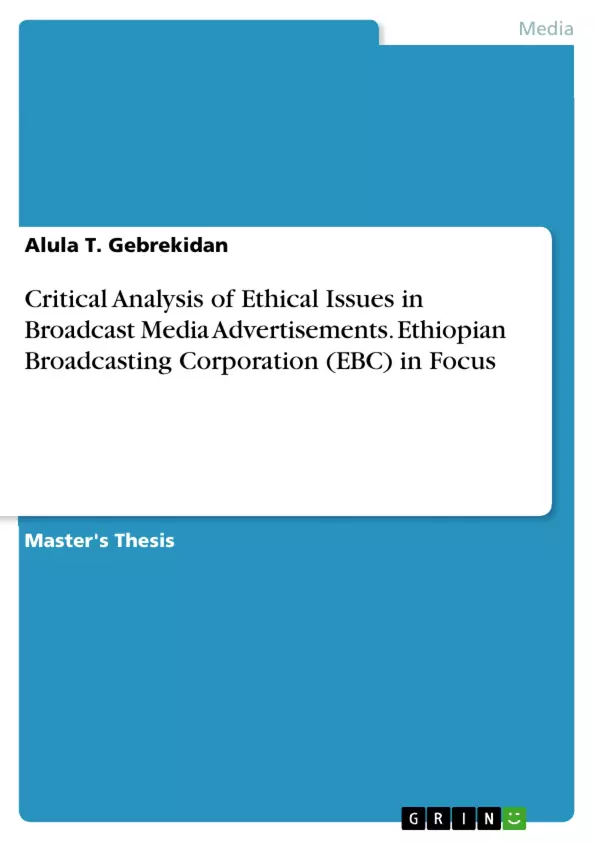This research project has explored and critically examined the practice of advertisement and its ethical considerations in Ethiopia particularly the practice in Ethiopian Broadcasting Corporation. A qualitative inquiry approach was employed for answering the investigation queries and to attain objectives of the study. The sample advertisement clips of this study were rhetorically analyzed.
Moreover, four focus group discussions and twelve individual in-depth interviews have been used to further tighten the data obtained from the qualitative content analysis segment of the study and to explore the audiences’ perception towards advertisements. 30 commercials broadcasted in three years period were purposefully selected. The selected commercials were analyzed and interpreted thematically to find out their apparent content. Furthermore, relevant literatures were also reviewed.
The professional practice and the cooperative leadership among stakeholders in the sector were seen critically. The cultural and ethical aspects of the advertisements got analyzed in this study. The extensive literature review on media and advertisement, with universal ethics theory, facilitated the structuring of the research questions, which addressed the ethical issues in the advertising sector.
The moral standard ruling the advertising industry; the ethical guidelines and the proclamation of advertisement with the universal principles of truth, human dignity and social responsibility are clearly stated in this study. In this qualitative inquiry, data were gathered through in depth interviews and focus group discussions. In addition to this, qualitative content analysis was employed. This was done by viewing and reviewing advertisement clips through the eyes of rhetorical criticism. The interview process lasted two months. The analysis of this study has been grouped in to two. These are; the findings of critical analysis by the researcher (done through viewing the advertisement clips) and findings from the focus group discussions and in depth interviews. Findings implied that most of the advertisements analyzed in this study might not favor the social values and norms. Most of the advertisement clips analyzed under this study seem limiting the role and the capacity of women and children. In some advertisements, women are represented as sex objects. [...]
Inhaltsverzeichnis (Table of Contents)
- CHAPTER ONE
- 1. INTRODUCTION
- 1.1. Background of the Study
- 1.2. Statement of the Problem
- 1.3. Objectives of the Study
- 1.3.1 General Objective
- 1.3.2 Specific Objectives
- 1.4. Research Questions
- 1.5. Significance of the Study
- 1.6. Scope of the Study
- 1.7. Limitation of the Study
- 1.8. Organization of the Study
- CHAPTER TWO
- 2. LITERATURE REVIEW
- 2.1. The Importance of Advertising
- 2.1.1 Advertising and Information
- 2.2. Ethics and Ethical Issues in Advertising
- 2.2.1 Concrete Sets of Criteria for Ethical Advertising in Ethiopia
- 2.3 Universal Principles as Ethical Theory in Advertising
- 2.3.1 Truth
- 2.3.2 Human Dignity
- 2.3.3 Advertisement and cultural Values
- 2.4. Women and Advertising
- 2.4.1 The Sex Appeal
- 2.4.2 Idealized Image/Representation of Women in Advertisement
- 2.5. Theoretical Framework
- 2.5.1 Social Responsibility Theory
Zielsetzung und Themenschwerpunkte (Objectives and Key Themes)
This research aims to explore and critically analyze the ethical considerations of advertising practices in Ethiopia, focusing specifically on the Ethiopian Broadcasting Corporation (EBC). It seeks to understand the ethical implications of advertisements in relation to social values, cultural norms, and the representation of women and children. Through a qualitative inquiry approach, the study examines various dimensions of advertising ethics, including professional practice, cooperative leadership, and the role of universal principles in promoting truth, human dignity, and social responsibility.
- Ethical considerations in advertising practices in Ethiopia
- The impact of advertisements on social values and cultural norms
- The representation of women and children in advertisements
- The role of universal principles in promoting truth, human dignity, and social responsibility in advertising
- The professional practice and cooperative leadership among stakeholders in the advertising sector
Zusammenfassung der Kapitel (Chapter Summaries)
Chapter One introduces the study, outlining its background, problem statement, objectives, research questions, significance, scope, limitations, and organization. It lays the foundation for the research by providing context and defining key concepts.
Chapter Two delves into the literature review, exploring the importance of advertising and its relationship to information. It further examines the ethical issues surrounding advertising, focusing on concrete criteria for ethical advertising in Ethiopia and exploring universal principles as an ethical theory. The chapter also addresses the representation of women in advertising, discussing the use of sex appeal and idealized images.
Schlüsselwörter (Keywords)
The research focuses on ethical issues, advertising practices, Ethiopian Broadcasting Corporation, social values, cultural norms, women representation, children representation, universal principles, truth, human dignity, social responsibility, professional practice, and cooperative leadership in the advertising sector.
Frequently Asked Questions
What is the focus of the study on Ethiopian broadcast media?
The research critically examines the ethical practices of advertising at the Ethiopian Broadcasting Corporation (EBC).
What are the main ethical issues found in EBC advertisements?
Key issues include the misrepresentation of women as sex objects and the limited portrayal of the roles of children and social values.
What methodology was used to analyze the commercials?
The study used qualitative content analysis, rhetorical criticism, focus group discussions, and in-depth individual interviews.
How are women represented in the analyzed Ethiopian advertisements?
Findings imply that many advertisements use sex appeal or idealized images that limit the professional and social capacity of women.
Which ethical theory guided this research?
The study is facilitated by the Universal Ethics Theory and the Social Responsibility Theory of the media.
- Quote paper
- Alula T. Gebrekidan (Author), 2017, Critical Analysis of Ethical Issues in Broadcast Media Advertisements. Ethiopian Broadcasting Corporation (EBC) in Focus, Munich, GRIN Verlag, https://www.grin.com/document/373661



